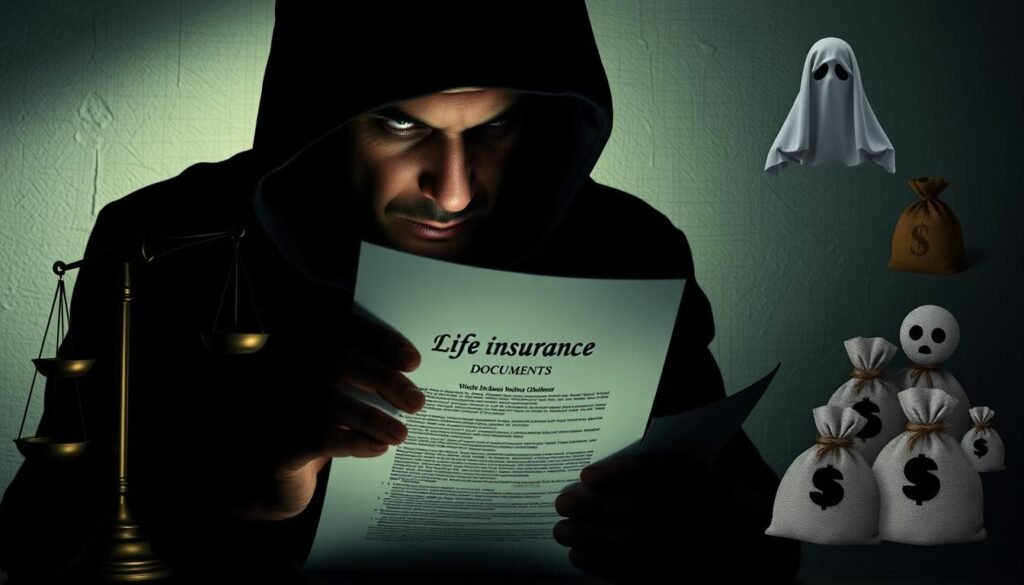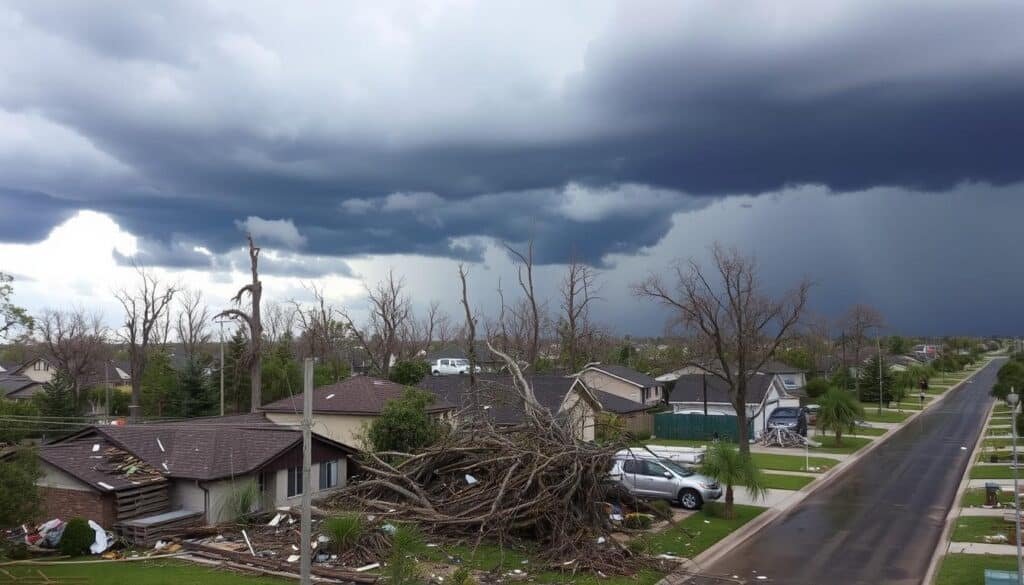Insurance scams cost Americans billions every year. Anyone can fall victim, but older people are often targeted. These scams come in many forms, like asking for personal info or making fake claims.
They also include selling fake policies, pushing to switch, and lying about rates. The FBI says insurance fraud costs over $40 billion yearly. This includes health scams, making premiums go up by $400 to $700 a year for families.
Key Takeaways
- Insurance scams are a big problem, costing Americans billions every year.
- Scammers often target older citizens and use tricks like fake policies and pressure.
- The cost of insurance fraud is passed on to consumers through higher premiums.
- Checking if insurance providers and policies are real is key to avoiding scams.
- Telling authorities about suspected fraud helps fight this big issue.
Understanding the Impact of Insurance Fraud
Insurance fraud is a big problem that hurts the insurance industry and consumers. The FBI says it costs businesses and people $308.6 billion a year. This means families pay $400 to $700 more each year for insurance because of fraud.
The True Cost to Consumers
Insurance fraud affects more than just insurance companies. It leads to higher premiums for everyone. Life insurance fraud costs $74.7 billion, and Medicare fraud is $60 billion. Property & casualty fraud totals $45 billion, with auto theft fraud adding $7.4 billion.
Health insurance fraud is $36.3 billion, and workers’ compensation fraud is $34 billion.
Who Can Become a Victim
Anyone can fall victim to insurance fraud. It doesn’t matter who you are. Scammers are smart and keep finding new ways to trick people.
Why Scammers Target Insurance
Scammers go after insurance because of the big money and the complex policies. The FBI says the insurance industry loses about $40 billion to fraud each year. In the Property & Casualty sector, almost 10% of losses are from fake claims.
Criminals are smart and always coming up with new tricks. They try to stay ahead of those trying to stop them.
To fight insurance fraud, the industry needs to use new identity verification tools. It should also focus on preventing fraud and catching fake claims early.
Common Life Insurance Scams and Red Flags

The insurance world faces fraud, with life insurance scams being a big worry. In 2020, fraud in life insurance hit $74.7 billion in the U.S., a Coalition Against Insurance Fraud found. It’s key for people to watch out for these scams.
Scammers might ask for personal info or money, saying it’s for a “free” policy or a “special deal.” They might also try to claim fake benefits or sell fake policies. Be cautious of urgent requests or rates that seem too low.
- Forgery of ownership: This fraud means someone changes who owns a policy without permission. It can slow down claims and lead to legal trouble.
- Application fraud: Giving false info on a life insurance form is fraud. It can lead to legal issues and reports to the police.
- Death fraud: Some people fake their death to get life insurance money. This scam might also involve murder to get the money.
Scammers might use fake documents or websites to look real. The National Association of Insurance Commissioners warns about deals that are too cheap. Real financial places don’t have many mistakes in their writing.
To avoid scams, watch out for pushy tactics, unsolicited calls, and deals that seem too good. Check if an agent is licensed and contact your state’s insurance department. Being careful and protecting your info can help you avoid these scams.
| Punishment for Life Insurance Fraud | Life Insurance Fraud Detection Tips | Actions to Take if Victimized |
|---|---|---|
| Penalties for life insurance fraud can include denied policies, higher premiums, fines, and jail. It depends on the crime and if someone is found guilty. |
|
|
If you think there’s fraud in life insurance, act fast to protect yourself. Knowing the signs and staying alert can help you avoid these scams.
Staged Auto Accident Schemes and Prevention

Auto insurance fraud, especially staged accidents, is a big problem. It costs consumers billions of dollars each year. Scammers often target areas with more money, new or rental cars, and vulnerable drivers like women and seniors.
Types of Staged Accidents
There are many types of staged accidents. These include the “drive down,” “swoop and squat,” “T-bone,” “panic stop,” and “sideswipe” tactics. These scams use multiple vehicles to look like an accident happened.
Warning Signs to Watch For
- Reckless driving by other vehicles involved in the accident
- Drivers insisting not to involve the police or authorities
- Individuals claiming excessive or exaggerated damages
- Requests for cash payments to avoid involving insurance companies
Prevention Strategies
To avoid staged accidents, follow these tips:
- Avoid tailgating or driving too closely to other vehicles
- Steer clear of reckless or aggressive drivers
- Practice defensive driving and maintain a safe following distance
- Involve the police immediately after an accident, even if it seems minor
- Inform your insurance company promptly about the incident
- Take photographs of any damage and gather witness information
- Do not ignore minor damages or accept cash payments at the scene
By staying alert and following these tips, you can lower your risk of being a victim. This helps fight auto insurance fraud.
| Staged Accident Scheme | Description |
|---|---|
| Swoop and Squat | Typically involves three vehicles on city streets or four on freeways. The “squat” vehicle suddenly brakes in front of the target, causing the “swoop” vehicle to collide with the target. |
| T-Bone | The perpetrator’s vehicle runs a red light or stop sign, intentionally colliding with the side of the target vehicle. |
| Panic Stop | The perpetrator’s vehicle suddenly brakes, causing the target vehicle to rear-end them. |
| Sideswipe | The perpetrator’s vehicle intentionally sideswipes the target vehicle, often on multi-lane roads or highways. |
Insurance Scams During Natural Disasters

Natural disasters can bring out the best in people, but they also attract scammers. It’s important to watch out for insurance scams and unlicensed contractors during these times.
Scammers might try to sell more insurance right before or after a disaster. Be careful of unsolicited calls and always check who is calling. Some places have rules about buying new insurance before or after a storm warning.
After disasters, unlicensed contractors might show up. They might not be who they say they are. Always check if a contractor is licensed and insured before hiring them.
To avoid disaster fraud, follow these tips:
- Be careful of storm chasers or unsolicited offers for emergency coverage. Make sure any insurance provider or contractor is real before agreeing to work.
- Don’t pay cash upfront to unlicensed contractors. Use a check or credit card instead to keep a record of payments.
- Get a detailed written contract that includes prices, cleanup plans, and when the work will start and end.
- If you think someone is scamming you, call the FEMA Disaster Fraud Hotline at 1-866-720-5721.
By being careful and checking the credentials of anyone offering services, you can avoid disaster fraud.
| Key Statistics | Insights |
|---|---|
| Insurance fraud is a felony, and lying to your insurance company can make your coverage invalid. | Homeowners need to be careful when making insurance claims or hiring contractors after a disaster. |
| The National Insurance Crime Bureau (NICB) says contractors might rush you, especially for non-essential or temporary repairs. | Real contractors should give you a detailed contract and a clear timeline for the work. |
| The NICB suggests getting recommendations from friends and neighbors for contractors. | Getting referrals from people you trust can help you find a reputable and licensed contractor. |
| FEMA does not endorse specific contractors or loan companies. | Be cautious of anyone claiming to be endorsed by FEMA. |
By being careful and checking the credentials of anyone offering services, you can avoid disaster fraud.
Vehicle-Related Insurance Fraud Tactics
Auto insurance fraud costs Americans billions each year. It often involves rental cars, luxury vehicles, and exaggerated claims. Knowing these tactics helps drivers avoid scams.
Rental Car Scams
Rental car fraud includes forcing extra insurance sales or creating fake rental companies. Agents might claim existing damages to get more money. Always check the car, decline extra insurance if you’re covered, and watch out for pressure from agents.
Luxury Vehicle Fraud
Luxury car scams include insuring non-existent cars or selling insured ones to report them stolen. Scammers target high-value cars for bigger payouts. Be cautious of claims about expensive cars and check the policy and car ownership.
Damage Exaggeration Schemes
Scammers inflate damage claims by inventing problems or adding “ghost passengers.” This way, they get more money than needed. Document damage with photos, report to the police, and work with your insurance to ensure accurate claims.
By being alert and proactive, drivers can avoid these scams. This helps fight insurance fraud in the U.S.
How to Verify Insurance Legitimacy

Protecting yourself from insurance scams is key. Before sharing personal info or paying, research your insurance provider well. Check your insurance documents for official contact info. Avoid relying on ads or unexpected messages.
Confirming an insurance provider’s legitimacy is easy. Contact your state’s insurance division. They keep records of licensed insurers and agents. Your state’s insurance commissioners can tell you if the company and agent are legit.
Watch out for very low rates. While cheap coverage is nice, be cautious of deals that seem too cheap. Real insurance rates reflect risk factors. Rates way below average might be a scam.
- Use official contact information from insurance documents, not unsolicited sources
- Check with your state’s insurance division to confirm the company and agent are licensed
- Be wary of excessively low insurance rates that seem too good to be true
- Report suspected fraud to state consumer protection divisions, fraud units, the Federal Trade Commission, or the National Insurance Crime Bureau
- Gather all related documents and evidence when reporting insurance fraud
Reporting suspected insurance fraud is important. If you think you’ve found a scam, contact your state’s fraud unit or the Federal Trade Commission. Have all your documents ready to help with the investigation.
By following these steps, you can avoid insurance scams. You’ll know your coverage is from a reliable provider.
Also Read : What Are The Benefits Of Self Insurance?
Conclusion
It’s key to protect yourself from insurance scams to keep your money safe. Watch out for unsolicited offers and check if insurance providers are real. If something seems off, tell the right people.
Be careful of offers that seem too good to be true. Always check the insurance company’s credentials before you deal with them. If you think you’ve been scammed, report it and get legal advice if needed.
By spreading the word and fighting insurance fraud, we can all stay safe. Stay informed, be active, and protect your money from scams.
FAQs
Q: What are some common health insurance scams to watch out for?
A: Common health insurance scams include fraudulent claims for services not received, schemes to sell insurance without a license, and attempts to steal personal information through phishing tactics. Always verify the credentials of an insurance agent before engaging with them.
Q: How can I protect myself from health insurance scams?
A: To protect yourself from health insurance scams, always research health plans thoroughly, check the credentials of your insurance agent, and be cautious of unsolicited offers. It’s also advisable to review your explanation of benefits regularly to spot any discrepancies.
Q: What should I do if I suspect fraud in my health insurance claims?
A: If you suspect fraud, you should contact your insurance company immediately to report your concerns. They can investigate the issue further. Additionally, you may want to reach out to your state’s fraud bureau for additional assistance.
Q: What are the signs of a fraudulent health insurance policy?
A: Signs of a fraudulent health insurance policy include promises of low premiums with comprehensive coverage that seems too good to be true, pressure tactics to sign up quickly, and a lack of a physical address or a phone number that doesn’t connect to a legitimate business.
Q: How can I choose a health plan that is less likely to be involved in fraud schemes?
A: To choose a health plan that is less likely to be involved in fraud schemes, opt for providers that are well-reviewed by other consumers, check if they are accredited by relevant organizations, and ensure they have a clear and accessible customer service system to address any issues.
Q: What is the role of the health insurance marketplace in preventing scams?
A: The health insurance marketplace provides regulated plans that must meet certain standards, making it harder for fraudulent schemes to operate. It offers a platform for consumers to compare legitimate health plans and avoid unlicensed insurance offers.
Q: Are there specific types of insurance more prone to fraud schemes?
A: Yes, certain types of insurance, such as automobile insurance and health insurance, are more prone to fraud schemes. This can include fraudulent or inflated insurance claims that are harder to detect without thorough investigation.
Q: What actions can I take if I have been a victim of insurance fraud?
A: If you have been a victim of insurance fraud, you should contact your insurance company to report the fraudulent activity, document all related information, and file a report with your local law enforcement and the fraud bureau. Seeking legal advice might also be a beneficial step.
Q: How do health insurance scams impact consumers financially?
A: Health insurance scams can greatly impact consumers financially by leading to unexpected out-of-pocket expenses, denial of legitimate claims, and potential legal issues. Being informed and vigilant can help mitigate these risks.

